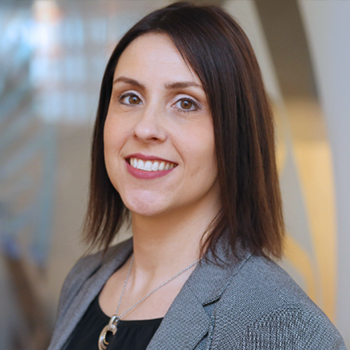CURRICULUM
curriculum that works around your schedule
Through coursework and a capstone project, you’ll evaluate communication practices in patient-provider relationships, health organizations and the media, and ask meaningful questions about their consequences.
All courses are 100% online and asynchronous, with no specific days or times you are required to be online. Each class requires weekly deadlines, so you’ll interact with other students on a regular basis and feel like you’re part of a program with colleagues (as opposed to complete self-paced learning). All deadlines allow you to complete work during your own free time.
What is unique about the curriculum in HCOM?
What is unique about the
curriculum in HCOM?





Click here to read more questions & answers.
Click here to read more questions & answers.

CREDITS
required for the HCOM degree

CREDITS
must be taken through the Department of Communication

COURSES
are required for the degree
Sample Course Schedules and Descriptions
Each semester, full-time students can take up to 4 online courses for a total of 12 credit hours: Course loads are customizable based upon students’ individual needs for degree-completion time: 1-year masters’ students will take 4 courses per semester; 2-year masters’ students will take 2 courses per semester. Part-time enrollment is also available.
Courses operate Wednesday through Tuesday, with two to three deadlines per week. For example, a course module begins on Wednesday with readings and a brief assignment or paper due on Sunday, and reflections and responses to peers due on Tuesday. This allows you to fit courses into your professional work schedule and complete the bulk of assignments on the weekend.
Capstone Individual Study (4 credits)
The Capstone Individual Study is this program’s version of a master’s thesis. During this eight-week course, students will design and create their “capstone project” which will utilize all of the skills, knowledge, and expertise in health communication that they have gained in the past two years and apply them towards their own personal interests in the health communication field. This project will be guided and evaluated by a committee of HCOM faculty and other healthcare experts in the community. When complete, the capstone project will be something that students can add to their professional portfolios–a research paper, a webinar series, a dynamic presentation, etc.–that will help them establish themselves in their chosen professional arena as a health communication expert.
This course is offered the first 8 weeks of every semester.
Conflict Management in Healthcare (2 credits)
Conflict management is a fundamental communication process very common in health care situations. This course examines how people experience and manage disagreements within health contexts. We will learn about health communication and conflict within interpersonal, group, and organizational situations. Topics include conflict styles, communication strategies, bargaining and negotiating, group decision-making, organizational leadership, and third-party intervention.
This course will be offered Spring 2026 (April 1-April 28).
Cultural Considerations in Healthcare (2 credits)
This course provides an overview of the impact of culture on individuals’ understanding and management of health and illness. Additionally, we examine health disparities and challenges experienced by minority and marginalized populations and explore meaningful solutions to healthcare delivery.
This course will be offered Fall 2025 (November 5-December 9).
eHealth (2 credits)
This course focuses on the role of technology in health communication (also known as eHealth). Specifically, the course will compare and contrast features of older technology (e.g., telephone), newer technology (e.g., email, websites), and in-person interactions to better understand the ways new technologies are (and are not) changing our health-related communication. The course will use both classic and contemporary theoretical approaches to examine eHealth in organizational health communication, mass media health campaigns, provider-patient interactions, and health-related social support.
This course will be offered Fall 2025 (Nov 5-Dec 9)
The Future of Work in Health Communication (4 credits)
Navigating the emerging future of work in health communication requires understanding of complex and unpredictable interaction among technologies, organizing, and professions. This course will focus on the organization of healthcare to review and apply organizational communication theories to conceptualize the future of work in health communication. A principal insight will be that the future of work is ours to decide.
This course will be offered Fall 2025 (August 27-October 21).
Health Disparities (2 credits)
Course description coming soon!
This course will be offered Spring 2027
Healthcare Teams (2 credits)
Teamwork matters. This insight is not new to anyone who has worked in a team. Research confirms that team processes—how teams interact—shape their ability to manage conflict and produce desired outcomes (DeChurch et al., 2013; Mathieu et al., 2008), respond to emergent events and crises (Jahn & Black, 2017), and solve complex and cross-disciplinary problems (Barbour & James, 2015; Barley & Weickum, 2017). The last few decades have seen collaborative, team-based approaches transform multiple sectors including especially high-stakes domains such as the practice of medicine. The purpose of this course is to provide concrete strategies for intervening in team processes grounded in communication research.
This course will be offered Spring 2027.
Advocacy in Healthcare (2 credits)
Course description coming soon!
This course will be offered Spring 2026 (April 1- April 28)
Health and Family Communication (2 credits)
This course is designed to familiarize students with current perspectives on the interplay between family communication processes and health-related issues. Using theoretical foundations such as systems theory, communication privacy management theory, narrative theory and family communication patterns theory, we will explore the ways that family members communicate about health, cope with health-related problems and influence one another’s health-related behaviors. We will also examine how different family relationships (e.g. spouse, sibling, parent-child) may influence health communication and health-related behaviors, as well as different mediums through which such communication takes place (e.g. face-to-face, online, etc). By the end of this course, students should be able to identify a variety of health-related issues which necessitate family communication, understand the theoretical foundations underlying differences in the ways families communicate about health, exhibit familiarity with privacy concerns when sharing or distributing health-related information among family members, and identify strategies for generating successful or beneficial health-related communication among family members (as well as recognize problematic communicative behaviors).
This course will be offered Spring 2025 (April 2- April 29)
Introduction to Health Communication (4 credits)
This course is designed to familiarize students with theory and research on communication in health and illness contexts, focusing on how messages from interpersonal, organizational, cultural and media sources affect health beliefs and behaviors. We will explore communication in health care delivery, health care organizations, as well as health promotion and disease prevention. Spanning multiple levels of communication, different communicative channels, and the use of diverse communication media and technologies, this course will demonstrate a variety of perspectives from which scholars examine health communication at an individual, family, professional, organizational and societal level. By the end of this course, students should be able to identify a variety of health communication topics, understand the theoretical foundations underlying differences in the ways individuals communicate about health, exhibit familiarity with health campaign strategies and organizational influences on health, and identify strategies for generating successful or beneficial health-related communication (as well as recognize problematic communicative trends).
This course will be offered Fall 2025 (August 27-October 21).
Picturing Health (2 credits)
This course explores the role of visual imagery in health communication. Visual images are powerful tools for communicating ideas, but can also perpetuate stereotypes or misinformation. Students will learn methods for analysis of visual images and explore a variety of topics related to the visual communication of health, including: historical representations of health and illness, diagnostic imaging, stock photography, visual bias and stereotyping, documentary photography, and visual research methods. Students completing the course will be more knowledgeable about and critical of the health imagery they encounter and more thoughtful about the ways they and their organizations use it.
This course will be offered Fall 2026 (November 4-December 8).
Provider Patient Communication (4 credits)
The aim of the course is to provide students with a comprehensive perspective of the context in which communication between patients and providers are sent, received, exchanged, circulated and interpreted. The foundation that undergirds this course is built on two basic assumptions/principles:
- There is no one, singular, accepted best model for provider-patient communication, so while this form of communication is scientific due to its clinical content and purpose, it is also artistic because each conversation is different and necessarily tailored due to context, stakes and participants.
- We, as human beings and patients, are storytellers. We seek to tell the stories of our illnesses during encounters with healthcare providers in the hopes they listen and elicit the critical clinical information.
The course considers the following aspects of provider-patient communication, organized into 5 broad themes: (1) ways patients and providers frame illness experiences as stories; (2) the influence of healthcare education and training on provider-patient communication; (3) communication behaviors that promote constructive provider-patient interactions vs. communication behaviors that are barriers to effective interactions; (4) learning about U.S. provider-patient communication through international comparisons; and (5) an introduction to outside influences on provider-patient interactions including culture, technology and organizations.
This course will be offered Spring 2026 (January 21-March 17).
Health Communication Research Methods 1 (2 credits)
In a world where communication itself is a form of healthcare, how can we know which communication strategies actually work? Most of what we know about the role of communication in health comes from systematic collection and analysis of data. This course introduces social scientific methods for research on health communication and health outcomes. These methods may be used both to establish a theoretical basis for communication, and to facilitate the design and evaluation of actual messages and campaigns. Students will learn: how to frame questions that guide collection of data; how to measure knowledge, attitudes, and behavior; how to systematically evaluate or compare communication strategies; how to effectively use data in decision-making about programs; and how to read and understand the expert literature on health communication.
This course will be offered Summer 2025 (May 21-June 17).
Health Communication Research Methods 2 (2 credits)
This course is designed to enable and promote a very pragmatic approach to data analysis, combining statistical methods that support decision-making with highly focused qualitative methods that provide deeper insight. A primary objective, then, is explain how to begin building a repertoire of techniques – both quantitative and qualitative – that can be applied in likely research settings. Students will also learn how to implement these methods, and how to interpret the results they obtain from them. A consistent goal for all is to build sufficient knowledge and skills to be able to conduct some form of analysis independently, and to know how to enlist additional specialized expertise when needed.
This class will be offered Summer 2025 (June 18-July 15).
Stigma in Healthcare (2 credits)
Stigma, or qualities of individuals that are “deeply discrediting,” play a critical role in producing and perpetuating disparities in healthcare. This course is designed to familiarize students with theory and research that will cover: 1) definitions of stigma; 2) how stigma is communicated; 3) how stigma affects patients, caregivers, and healthcare providers; and 4) how stigma can be managed. By the end of the course, students should be able to identify stigma communication in healthcare contexts, including the messages, behaviors and attitudes that serve to disadvantage individuals. Students should also be able to identify strategies of managing stigma, toward creating more inclusive and equitable healthcare.
This course will be offered Fall 2026 (November 4-December 8).
Health Marketing (4 credits)
This course is designed to give students a greater understanding of the theory, research, and application of health campaigns. The health communication literature cuts across a number of disciplines including advertising, communication, marketing, public health, political science, psychology, and sociology. This course represents some of that diversity with an emphasis on the theoretical underpinnings of several theories used in health campaigns. In addition to understanding the theories behind many of today’s health campaigns, we will also spend time addressing important aspects of a campaign including formative research, audience segmentation, message tailoring, and evaluation. In all, the purpose of this course is to introduce students to many of the leading theoretical frameworks in the health campaign literature as well as provide them with some insight into the nuts and bolts of designing and evaluating a health campaign.
This course will be taught Spring 2026 (January 21-March 17)
MASTER'S DEGREE COURSE SCHEDULES
1-Year Course Schedules
2-Year Course Schedules

Required Courses for the HCOM Degree
Health Communication Research Methods 1 and 2 (4 credit hours)
Two research methods courses explore the variety of methods used in health communication research, including designs that are quantitative (e.g., using data from experimental or survey designs), qualitative (e.g., using data from observations, interviews, or interaction), or rhetorical (e.g., using texts or speeches as data). The goals of the research methods courses include developing skills needed to understand and critically analyze research.
Capstone Project (4 credit hours)
The capstone project is the final course in the program. It integrates knowledge and skills from prior coursework and experiential learning. This course enables students to demonstrate broad mastery of material for the promise of future employment opportunities and career advancement.
Health Communication Research Methods 1 (2 credits)
In a world where communication itself is a form of healthcare, how can we know which communication strategies actually work? Most of what we know about the role of communication in health comes from systematic collection and analysis of data. This course introduces social scientific methods for research on health communication and health outcomes. These methods may be used either to build general (theoretical) knowledge about communication or to aid in design and evaluation of actual messages and campaigns. Students will learn: how to frame questions that can guide collection of data; how to measure knowledge, attitudes, and behavior; how to systematically evaluate or compare communication strategies; how to effectively use data in making decisions about programs; and how to read and understand the expert literature on health communication.
Health Communication Research Methods 2 (2 credits)
This course is designed to promote a very pragmatic approach to data analysis, combining statistical methods that support decision-making with "high resolution" methods that provide deeper insight. A primary objective, then, is to begin building a repertoire of techniques that can be applied in likely research settings. No prior background in statistics is expected, and because students enter this course with diverse preparation, certain portions of the course will be individually tailored. By the end, everyone will have command of a core set of basic statistical techniques, and everyone will learn something new. A consistent goal for all is to know how to conduct some analysis independently and how to enlist additional specialized expertise when needed.
Capstone Individual Study (4 credits)
The Capstone Individual Study is this program's version of a master’s thesis. During this eight-week course, students will design and create their "capstone project" which will utilize all of the skills, knowledge, and expertise in health communication that they have gained in the past two years and apply them towards their own personal interests in the health communication field. This project will be guided and evaluated by a committee of HCOM faculty and other healthcare experts in the community. When complete, the capstone project will be something that students can add to their professional portfolios--a research paper, a webinar series, a dynamic presentation, etc.--that will help them establish themselves in their chosen professional arena as a health communication expert.
Learn more about the Capstone:
Students work with their Capstone instructor and two other committee members of their choosing to design an applied project that integrates skilled learned in HCOM with professional goals. Types of projects that students have completed include:
- Conducting an extensive literature review of a specific topic area
- Creating a webinar series or podcast
- Designing an organizational intervention in a health care setting
- Designing a media campaign, or
- Implementing a hybrid project combing the above options; or a “design your own” model of the student’s choosing